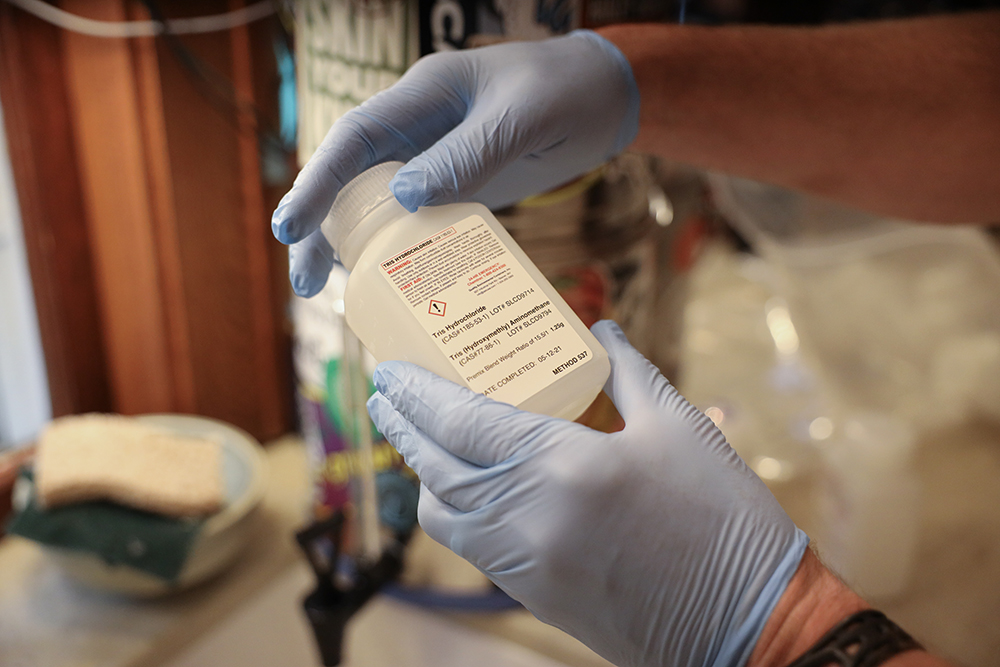A Waukesha County judge is extending a hold on an April ruling that could limit the ability of state regulators to clean up pollution from harmful forever chemicals known as PFAS.
Wisconsin Manufacturers and Commerce, or WMC, and Oconomowoc-based dry cleaner Leather Rich filed the lawsuit against the Department of Natural Resources, DNR Secretary Preston Cole and the Natural Resources Board in February of last year. WMC and Leather Rich argued the DNR does not have explicit authority to enforce standards around PFAS pollution without going through the state’s rulemaking process to list PFAS as hazardous substances.
PFAS, or perfluoroalkyl and polyfluoroalkyl substances, are thousands of synthetic chemicals found in firefighting foam and everyday products like stain-resistant clothing and cookware. The chemicals do not break down easily in the environment, and have been linked to serious health issues including thyroid disease and kidney and testicular cancers.
Stay informed on the latest news
Sign up for WPR’s email newsletter.
Waukesha County Circuit Court Judge Michael O. Bohren said a stay on the case would be appropriate because of the broad impact that enforcing the ruling would have. He noted the agency’s rulemaking authority under the spills law hadn’t been challenged prior to the current case.
“It puts the plaintiffs and the businesspeople and the people who supported the plaintiffs somewhat at risk for a period of time, but the stay also protects the overall state policy that the DNR is working on in the event this court is incorrect,” Bohren said.
The DNR is currently investigating PFAS contamination at nearly 100 sites across the state. As recently as last month, cities have shut down municipal wells due to concerning levels of the so-called “forever chemicals.” The agency has argued the state’s spills law gives it broad authority to require testing and cleanup of the chemicals.
Environmental groups such as the nonprofit law center Midwest Environmental Advocates, or MEA, sought to intervene in the Waukesha County case in June of last year, arguing the case could potentially undermine communities working under state law to deal with the forever chemicals.
In April, Bohren ruled in favor of WMC, but placed a stay on the decision while waiting for an official motion from the DNR to stay the court’s ruling pending appeal. The DNR filed an appeal soon after.
WMC’s attorney Lucas Vebber said in court the department could go through the state’s rulemaking process to keep doing the work it’s doing now.
“Absolutely nothing in this court’s order prohibits the defendants from doing any of the things they now say they cannot do, and are claiming are going to result in irreparable harm,” Vebber said. “The state’s now trying to argue that this court stepping in to eliminate the uncertainty is creating the very uncertainty that we were arguing against in the first instance.”
Vebber said the stay would harm business owners.
“They’re forced to comply, and then necessarily bear compliance costs with the unlawful illegal policies of the defendants,” Vebber said.
Gabe Johnson-Karp, an assistant attorney general for Wisconsin, said during the hearing enforcement of the ruling would harm the department’s work and the state’s economy.
“Wisconsin’s regulated community is familiar with the current status quo,” Johnson-Karp said. “This court recognized that the order in this case would be a departure from that status quo, and there will be disruptions to the regulated community. There is uncertainty, and with uncertainty comes economic slowdown and loss of tax revenues.”
Johnson-Karp said enforcing the ruling would also prevent the department from providing bottled water to households with wells contaminated by substances such as PFAS.
In a press release last week, MEA staff attorney Rob Lee said the court’s stay should remain in place.
“There is no good reason to exacerbate the physical, mental and economic harm suffered by those living in and around PFAS contamination sites in Wisconsin,” Lee said.
After the court’s decision Tuesday, Lee said in another press release that “the DNR’s efforts to keep Wisconsin families safe from PFAS contamination will ultimately be vindicated.”
MEA filed an amicus brief supporting the extended stay. Its participation in the case comes on behalf of a number of other public health and environmental advocates from throughout the state.
“Exposure to PFAS is not something that can be readily undone or mitigated once it has occurred,” said Beth Neary, co-president of the Wisconsin Environmental Health Network, in a press release. “They accumulate in the human body and remain there for long periods of time—there is no way to remove them.”
The Waukesha County case is not the only recent court action revolving around the DNR and the actions it can take regarding PFAS. In Jefferson County in January, a judge ruled that while the agency could test wastewater for PFAS, it couldn’t pursue enforcement until water quality standards are in place.
In February, the DNR voted to set drinking water standards for two major PFAS chemicals at 70 parts per trillion, in line with an advisory level set by the Environmental Protection Agency in 2016, though the DNR had initially proposed a combined 20 parts per trillion. The Legislature’s Joint Committee for Review of Administrative Rules, has requested a meeting to discuss the proposed regulations with the DNR.
Wisconsin Public Radio, © Copyright 2024, Board of Regents of the University of Wisconsin System and Wisconsin Educational Communications Board.


